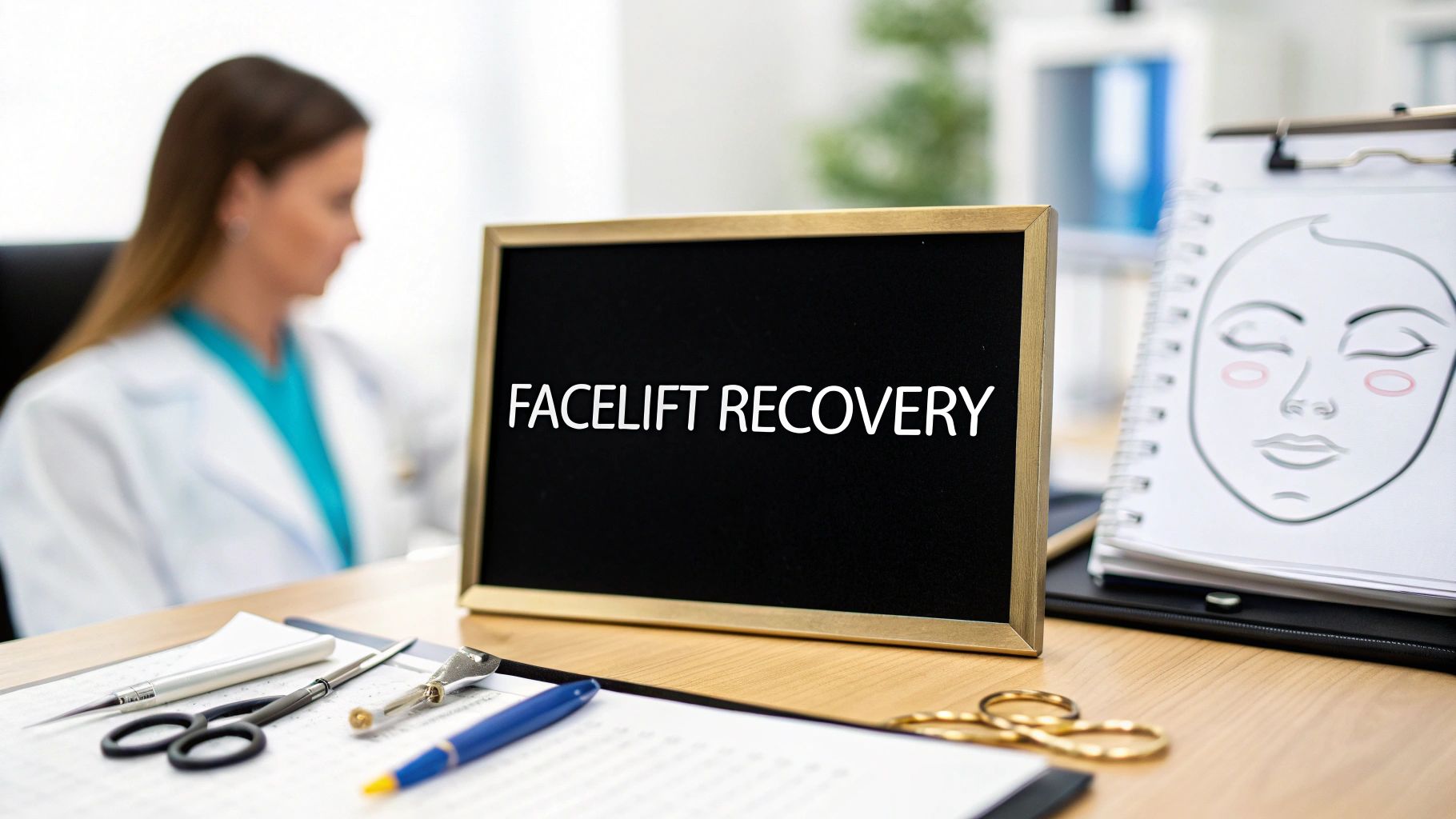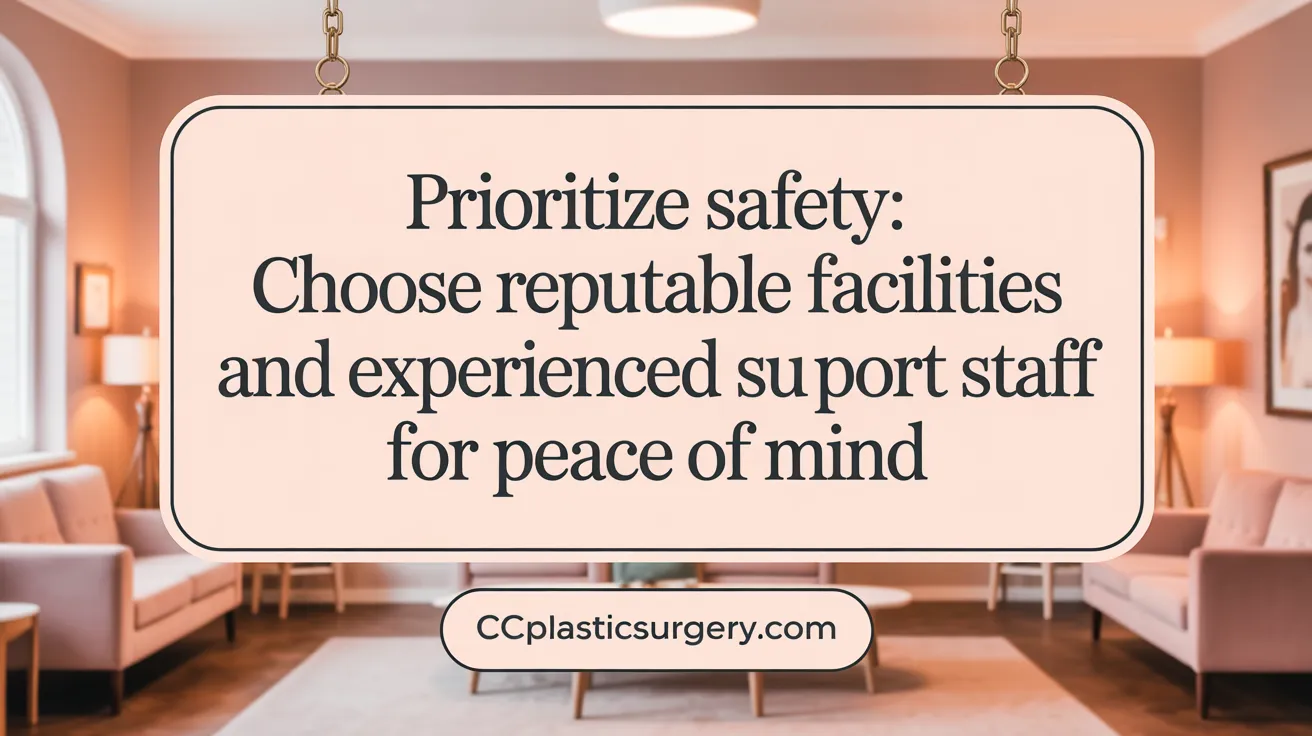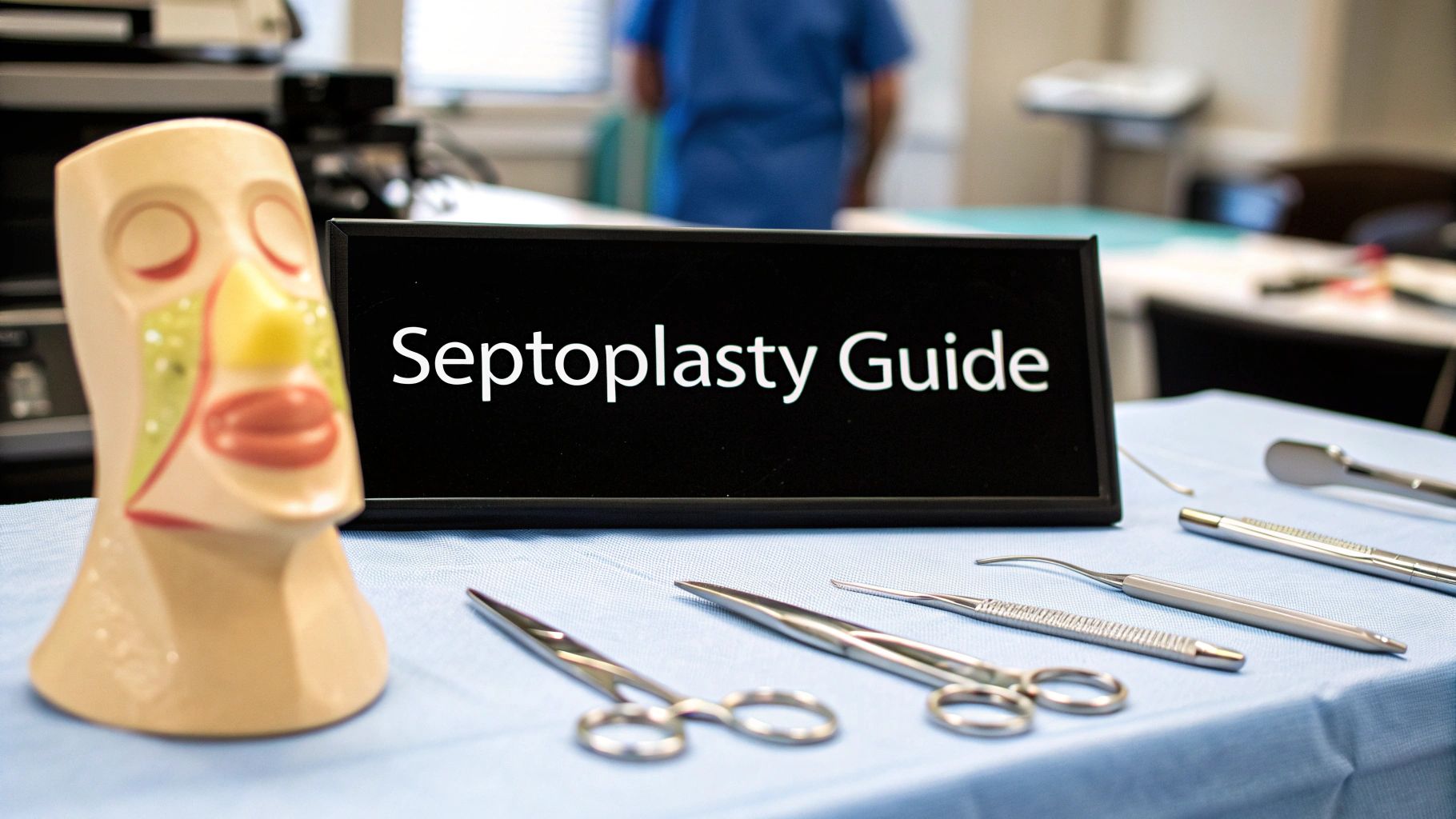
January 31, 2026
Your Week-by-Week Facelift Recovery Timeline
Navigate your facelift recovery timeline with confidence. This guide breaks down healing week-by-week, from day one to your final, natural-looking results.
Sep 4, 2025

Choosing the right plastic surgeon is a critical step toward achieving your aesthetic goals safely and successfully. With advancements in plastic surgery and a wide array of practitioners, it can be overwhelming to discern which surgeon best fits your unique needs. This guide will outline essential criteria, evaluation methods, and decision-making steps to empower you in finding a highly qualified, experienced, and trustworthy surgeon who aligns with your personal vision.
 Choosing the right plastic surgeon is a critical step toward achieving safe and satisfying results. One of the first factors to consider is board certification. Ensure the surgeon is certified by the American Board of Plastic Surgery (ABPS), the only recognized organization by the American Board of Medical Specialties. This certification confirms the surgeon has completed extensive training, passed rigorous exams, and adheres to high ethical and safety standards.
Choosing the right plastic surgeon is a critical step toward achieving safe and satisfying results. One of the first factors to consider is board certification. Ensure the surgeon is certified by the American Board of Plastic Surgery (ABPS), the only recognized organization by the American Board of Medical Specialties. This certification confirms the surgeon has completed extensive training, passed rigorous exams, and adheres to high ethical and safety standards.
Beyond certification, evaluate the surgeon’s specific experience with the procedure you're interested in, such as breast augmentation or liposuction. Ask about their years of practice, the number of cases they've performed, and whether they have specialized training in that area. Viewing their portfolio of before-and-after photos can provide insight into their aesthetic style and the consistency of their results.
Professional affiliations, like membership in the American Society of Plastic Surgeons, further indicate adherence to strict safety and training protocols. It’s also important to verify that the surgical facility is accredited by recognized organizations such as the Joint Commission or the AAAASF. These accreditations ensure the highest safety standards and quality of care.
Building trust and feeling comfortable communicating with your surgeon are fundamental. During consultations, ask questions about their approach, risks, and expected outcomes. A good surgeon listens carefully, provides honest advice, and discusses realistic results.
Finally, a comprehensive review of your medical history is essential. Your surgeon should evaluate your health conditions and tailor a personalized treatment plan that prioritizes safety.
Choosing a well-qualified, experienced, and communicative surgeon in an accredited facility will greatly increase your chances of a successful and satisfying surgical experience.

Ensuring your plastic surgeon is properly qualified is crucial for a safe and successful procedure. Board certification by the American Board of Plastic Surgery (ABPS) is considered the gold standard. This certification confirms that the surgeon has completed at least six years of surgical training after medical school, including a rigorous exam process. Only surgeons certified by the ABPS have proven their expertise in both aesthetic and reconstructive surgery.
Training duration and quality are vital indicators of a surgeon’s competence. A thorough residency program, ongoing education, and participation in specialized training programs demonstrate a sustained commitment to honing skills and keeping up with medical advances.
Membership in professional organizations such as the American Society of Plastic Surgeons (ASPS) or the American Society for Aesthetic Plastic Surgery (ASAPS) further confirms adherence to high safety and ethical standards. These memberships require ongoing education and compliance with strict professional codes.
Plastic surgeons dedicated to their field often pursue continuous learning through workshops, seminars, and research, which directly benefits their patients. It’s also beneficial to review patient testimonials and before-and-after photos. These can reveal a surgeon’s aesthetic style, consistency, and the satisfaction level of previous patients.
By researching these aspects, you minimize risks, ensure top-quality care, and increase your chances of achieving natural, satisfying results. Overall, a surgeon’s professional background reflects their dedication and capability to handle your procedure with skill and safety.

Your safety should be a top priority when opting for any cosmetic procedure. Facilities accredited by reputable organizations such as the AAAASF, JCAHO, or the Accreditation Association for Ambulatory Health Care have met rigorous standards for safety, sanitation, and quality of care. These accreditations require regular inspections and compliance with strict protocols, ensuring that your procedure takes place in a secure environment.
Qualified anesthesiologists, trained staff, and modern equipment are essential components of an accredited facility. These professionals are licensed and experienced, and they adhere to established safety protocols designed to reduce the risk of complications.
Research indicates that patients operated on in accredited centers experience lower complication and infection rates, as well as better overall outcomes. Hospitals with proper privileges and emergency preparedness are better equipped to handle unforeseen issues, providing peace of mind during your recovery.
Choosing a surgeon who performs procedures in an accredited setting not only increases the safety of your operation but also improves the reliability and consistency of your results. Ensuring the quality of the facility is a crucial step in the journey towards a successful and safe plastic surgery experience.
For more detailed information, searching for "plastic surgery facility accreditation and safety" can provide additional resources and insights.

Choosing the right plastic surgeon is a vital step for achieving satisfying results. The first aspect to examine is certification. Ensure the surgeon is certified by the American Board of Plastic Surgery, which is the only board recognized by the American Board of Medical Specialties. This certification indicates the surgeon has undergone extensive training, including at least six years of surgical education, and has passed rigorous exams.
Next, evaluate their experience specifically related to your procedure. Ask how many times they have performed the surgery you are interested in. A surgeon with a high volume of similar cases over several years demonstrates a strong record of expertise. For example, if you want breast augmentation, seek a surgeon with a proven track record in breast surgeries, including the number of procedures performed annually.
Review their portfolio of before-and-after photos, focusing on cases similar to your goals. Look for natural-looking results and consistency across their work. Patient testimonials and reviews can also provide insights into their skill level, aesthetic judgment, and patient satisfaction.
It’s important to have a thorough consultation where the surgeon discusses their experience with your specific procedure. During the appointment, inquire about their approach, techniques, and success stories. Feel comfortable asking questions that clarify their familiarity with your desired outcome.
Finally, confirm that the surgeon has hospital privileges at accredited facilities and that the surgical center where they operate meets safety standards. This ensures that your procedure is performed in a safe environment with qualified support staff.
By verifying certification, assessing specialized experience, reviewing visual results, and engaging in an open consultation, you can confidently match a surgeon’s expertise to your aesthetic goals and procedural needs.

To determine if a plastic surgeon can deliver results aligned with your desires, start by reviewing their portfolio of before-and-after photos. Focus on cases similar to your planned procedure to gauge their style and consistency in results. Confirm that your surgeon is certified by the American Board of Plastic Surgery, which verifies they have undergone extensive training and demonstrated proficiency in aesthetic procedures.
During your consultation, observe the surgeon's communication style. An ideal surgeon listens attentively, explains procedures and risks clearly, and discusses realistic outcomes without promising unattainable results. Trust your instincts—feeling comfortable with the surgeon’s approach and personality can significantly influence your satisfaction.
The environment matters too. Choose a facility that is accredited by reputable organizations such as JCAHO or AAAASF, ensuring safety and professionalism. A compassionate, qualified support team further enhances your experience, reinforcing confidence in your choice.
Ultimately, combining visual evidence of previous work, professional credentials, and a positive interaction forms a strong basis for evaluating whether a surgeon can meet your aesthetic expectations.

When preparing for your consultation, it’s important to ask detailed questions that will help you determine the surgeon's qualifications, experience, and approach. Inquire whether the surgeon is certified by the American Board of Plastic Surgery, the only recognized plastic surgery board by the American Board of Medical Specialties. Ask about their specific training in the procedure you're considering, including how many times they've performed it and their complication or re-operation rates.
Verify that the surgical facility is accredited by organizations like JCAHO or AAAASF and confirm if the surgeon has hospital privileges, ensuring safety and access to comprehensive care if needed. Discuss their anesthesia practices, specifically if a board-certified anesthesiologist will be involved, and ask about post-operative care protocols and how they manage complications.
Review their portfolio of before-and-after images of patients with similar cases to set realistic expectations. Make sure the surgeon’s aesthetic style aligns with your goals by observing the consistency and results of their work.
It's also crucial to evaluate their communication style; choose a surgeon who listens attentively, respects your concerns, and provides honest, detailed information. Consider asking about their follow-up procedures and how they handle revisions. Preparing thoughtful questions and gathering all this information will help you find a surgeon with whom you feel comfortable and trust.
During your consultation, avoid negative comparisons to other surgeons, as this can create unnecessary tension. Refrain from demanding unrealistic results or insisting on a particular technique without understanding its implications. It’s also important not to make false claims about your medical history or substance use, such as smoking or alcohol consumption, which might impact safety and outcomes.
Be cautious of discussing cost issues in a confrontational manner; instead, approach finances as part of the planning process. Avoid promising or expecting perfect results, as every surgery has limitations. Do not pressure the surgeon into scheduling surgery on short notice or bypassing recommended safety protocols.
Fostering a respectful and honest dialogue will establish trust and lead to better collaborative planning. Remember, professionalism and clarity in communication are vital for a positive surgical experience and achieving your desired goals.
Selecting the right plastic surgeon requires diligent research, thoughtful evaluation, and open communication. Prioritizing board certification, extensive experience with your specific procedure, and a strong patient-doctor rapport lays the foundation for safe and satisfying outcomes. Ensuring that your surgeon operates in a highly accredited facility staffed by expert professionals guarantees the highest safety standards. Preparing for your consultation with well-crafted questions and understanding what to avoid fosters a constructive relationship built on trust and transparency. Ultimately, the right surgeon is one whose qualifications, aesthetic approach, and care philosophy align with your individual goals, paving the way for a confident, informed decision and successful plastic surgery experience.

January 31, 2026
Navigate your facelift recovery timeline with confidence. This guide breaks down healing week-by-week, from day one to your final, natural-looking results.

January 30, 2026
Curious about what is a septoplasty procedure? Learn about the surgery, recovery, risks, and benefits.

January 30, 2026
Why Board Certification Matters for Your Plastic Surgery Journey